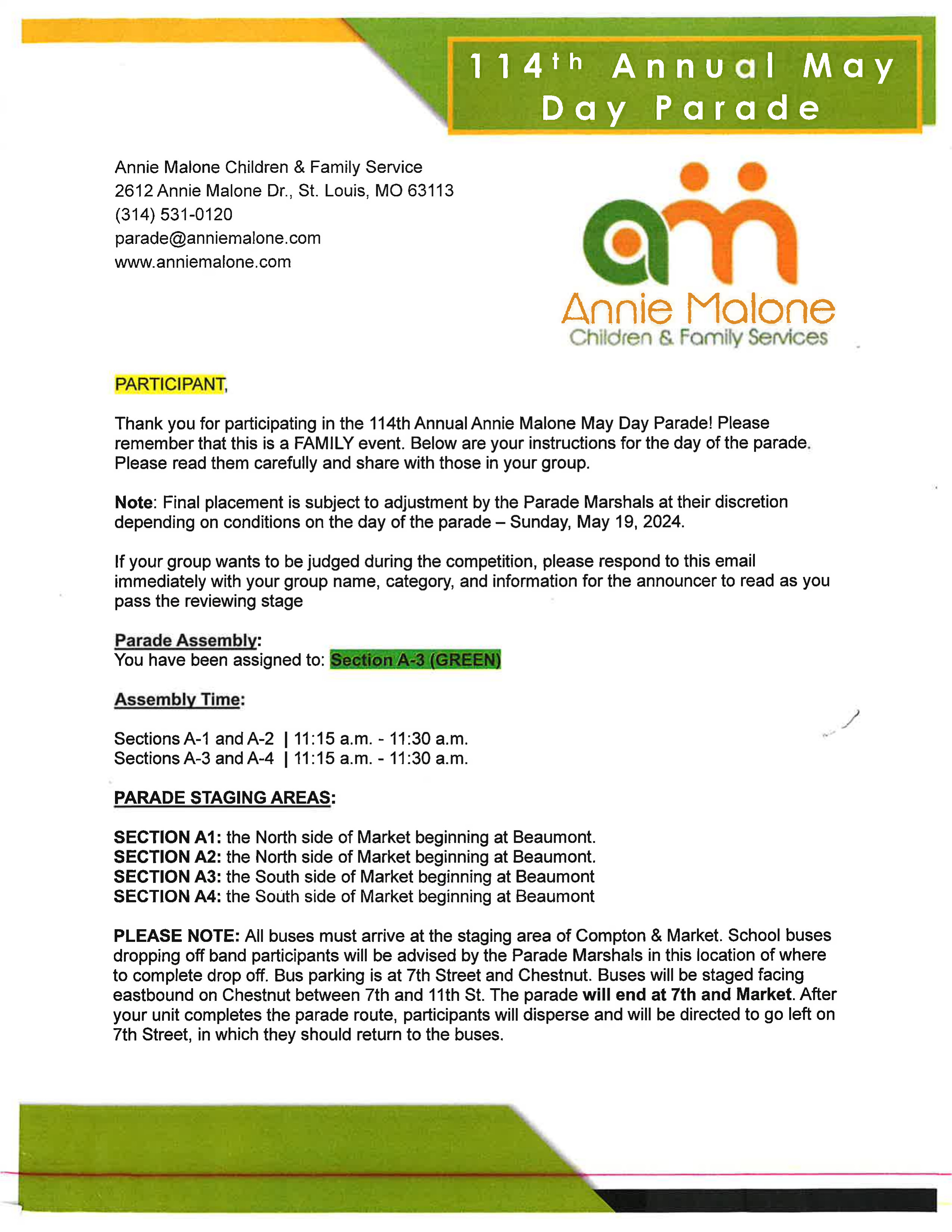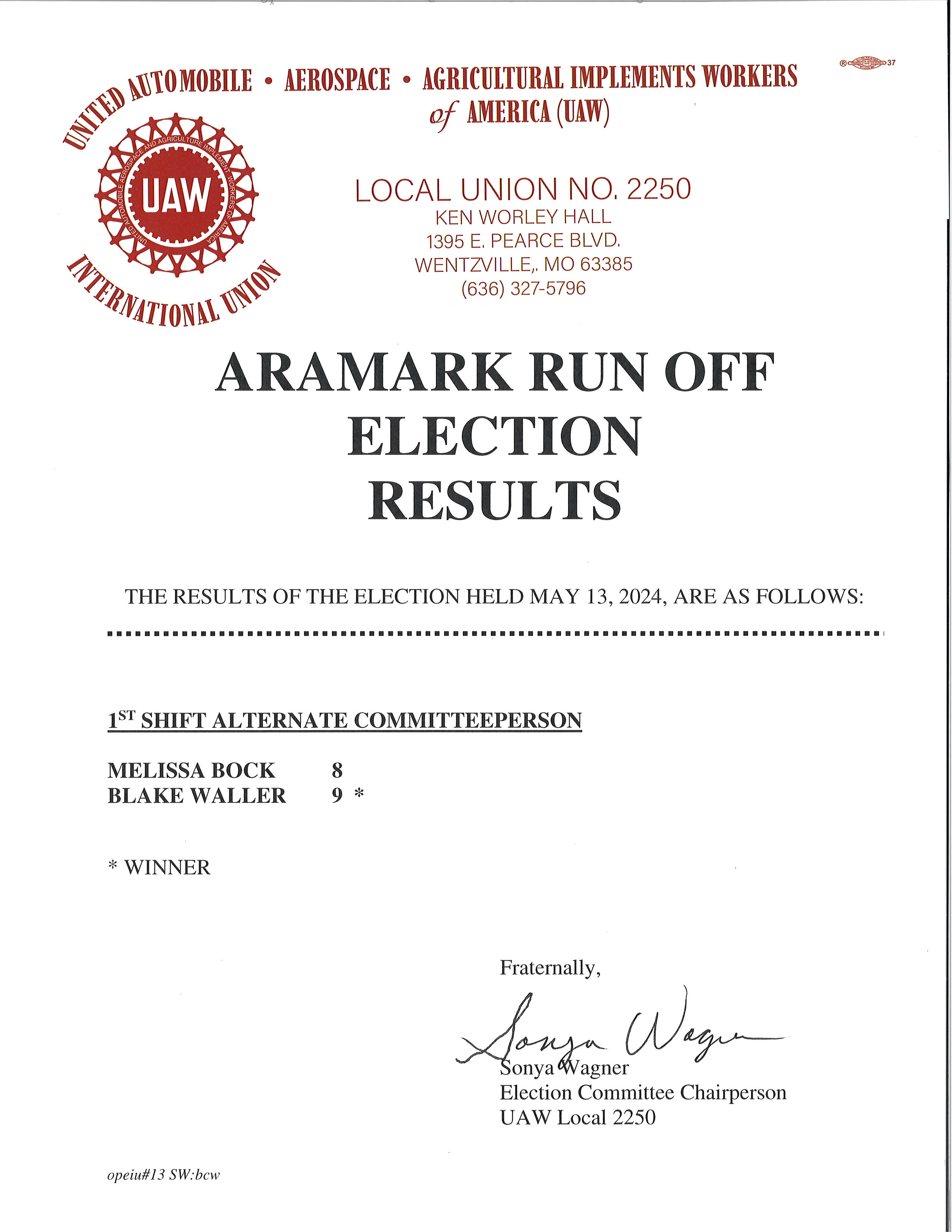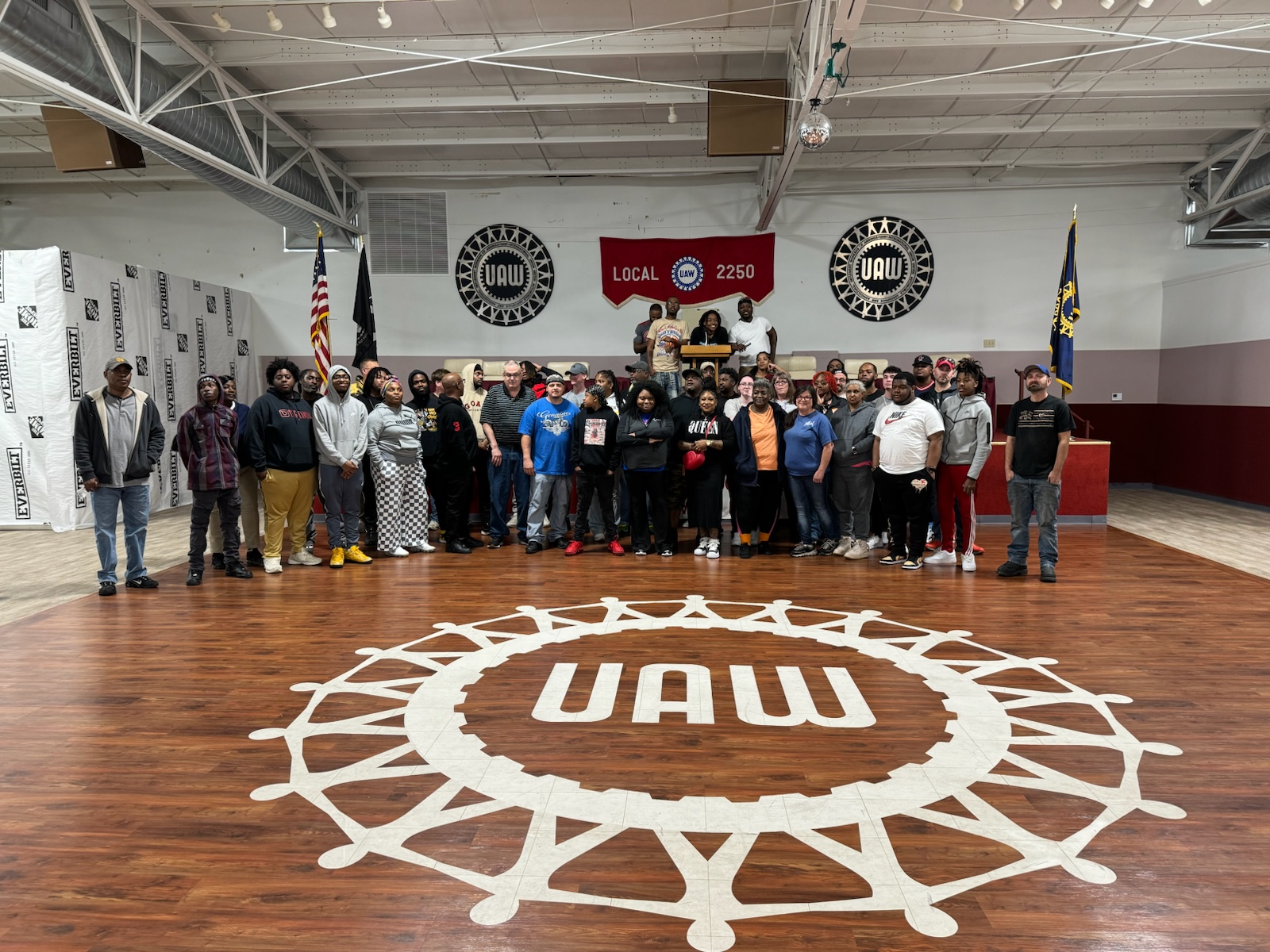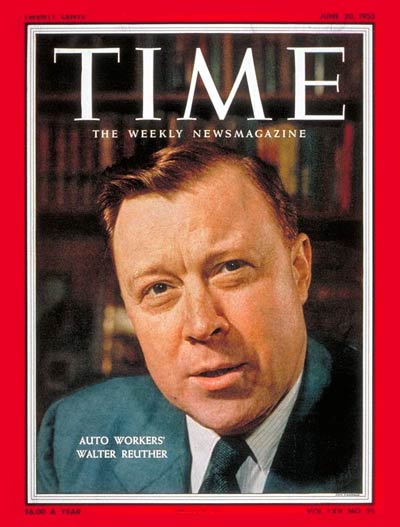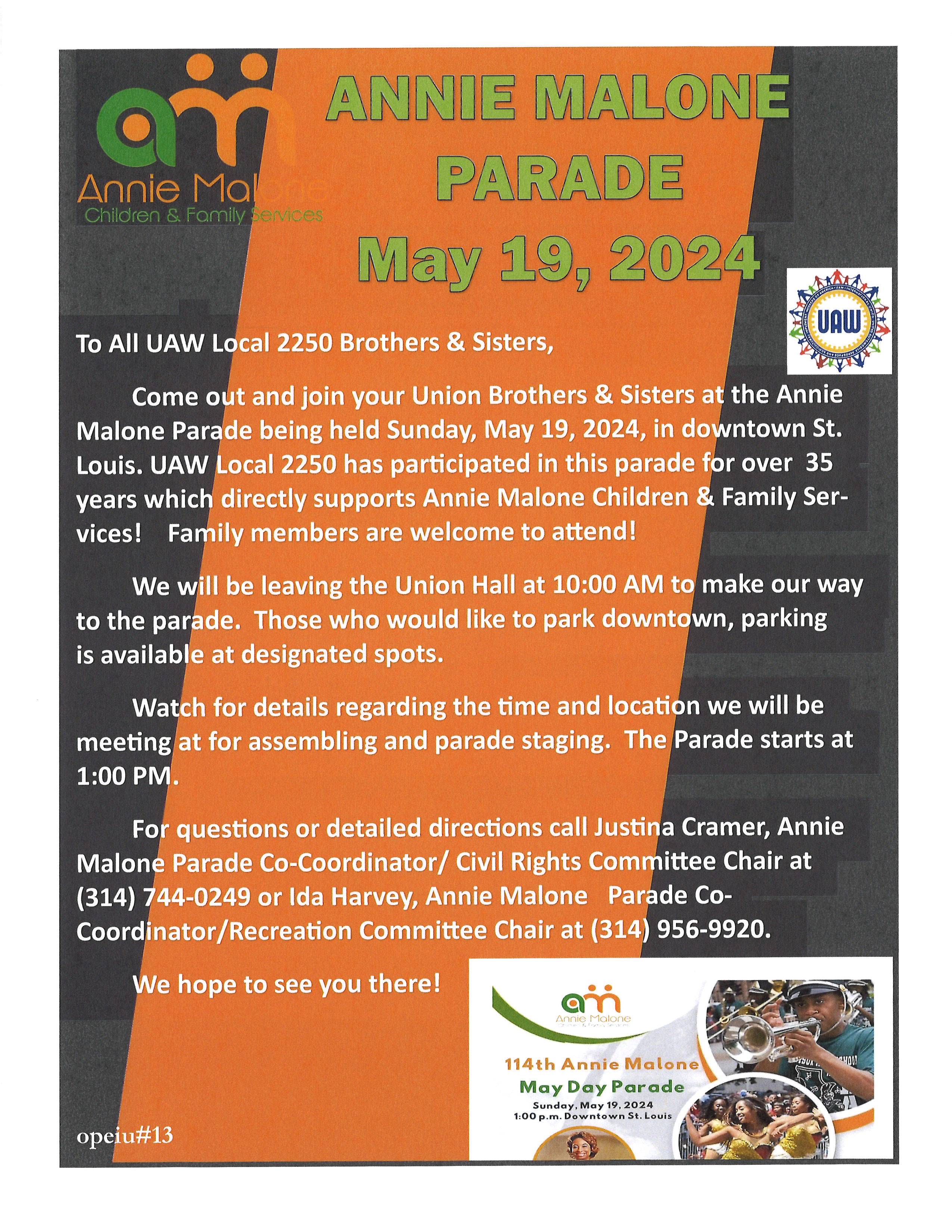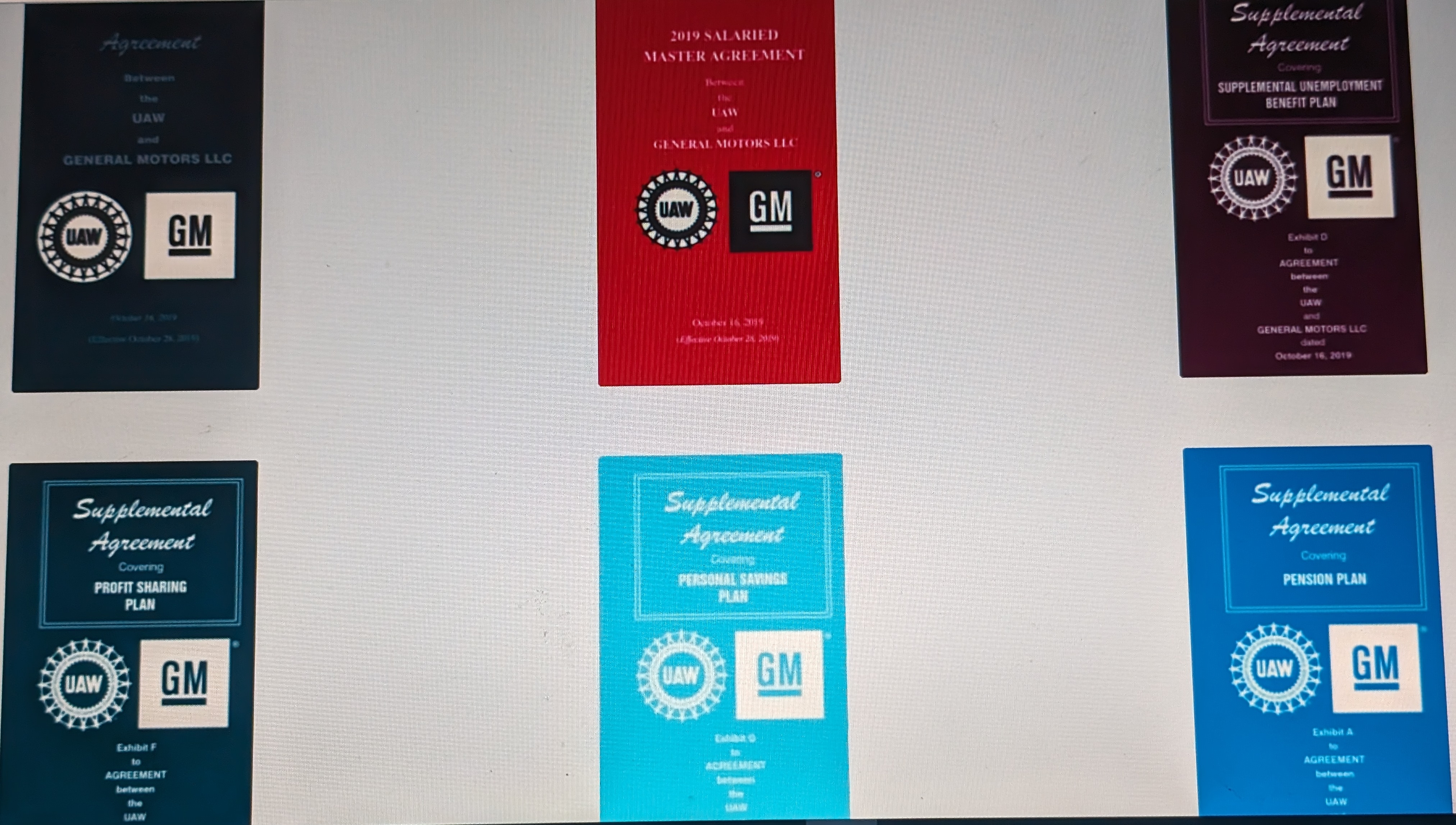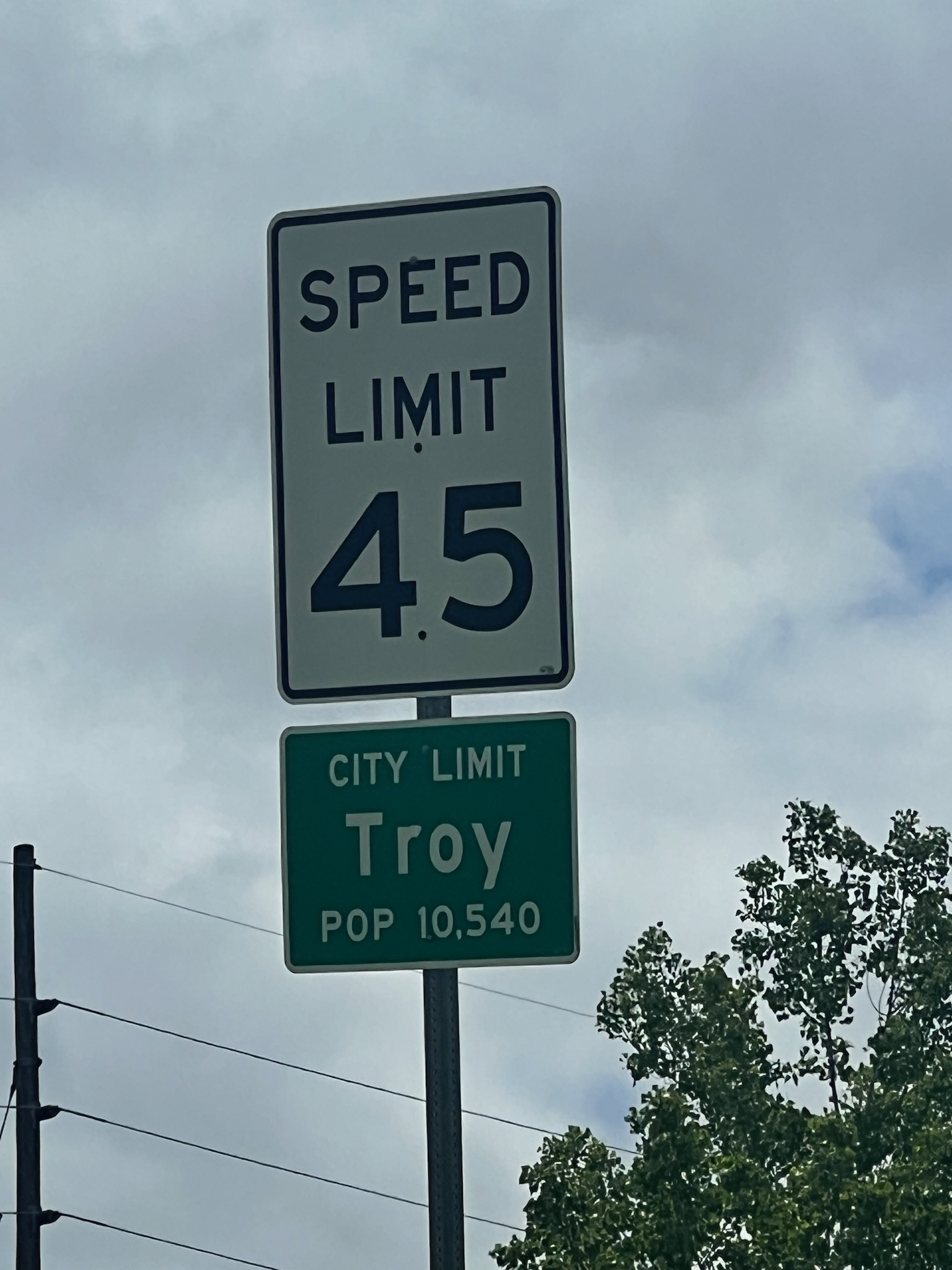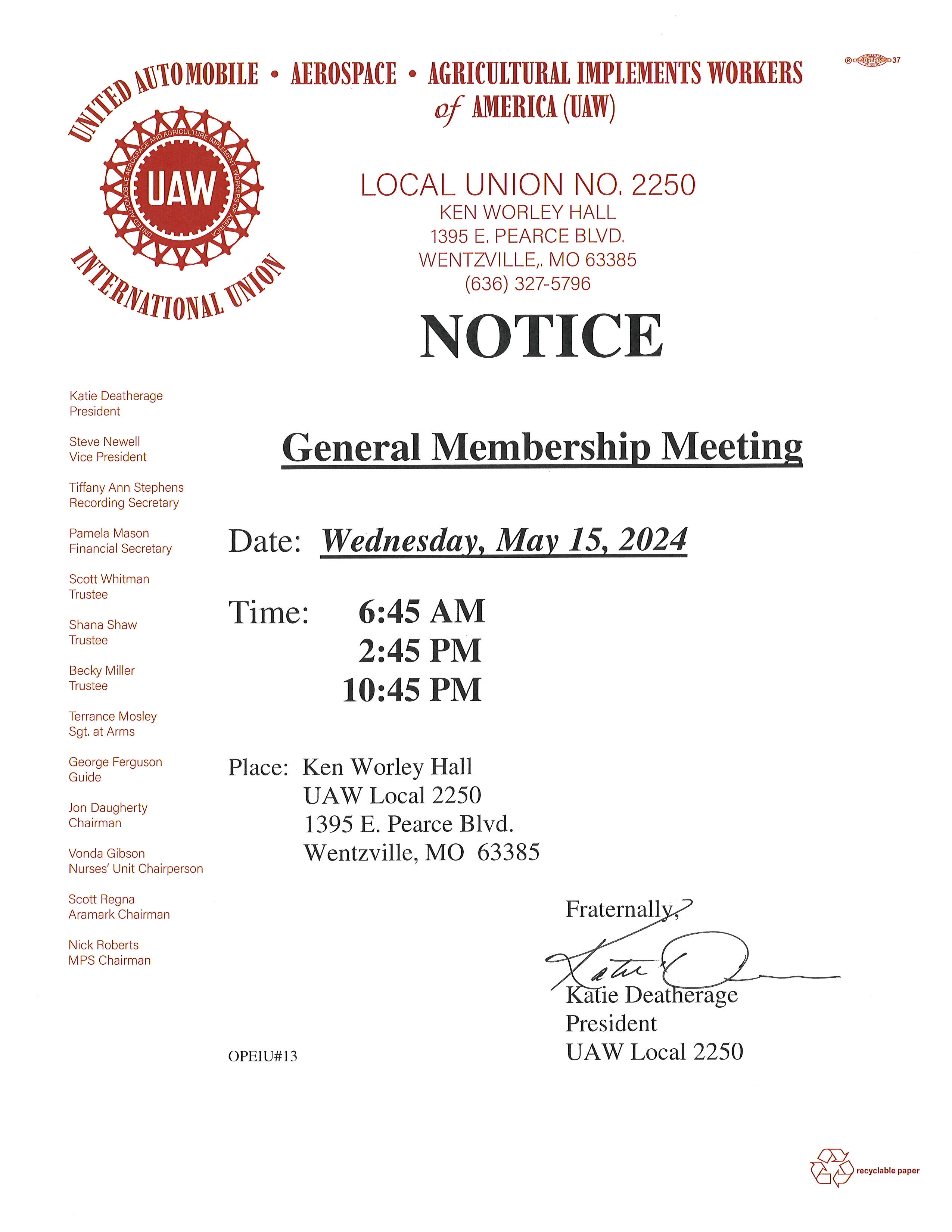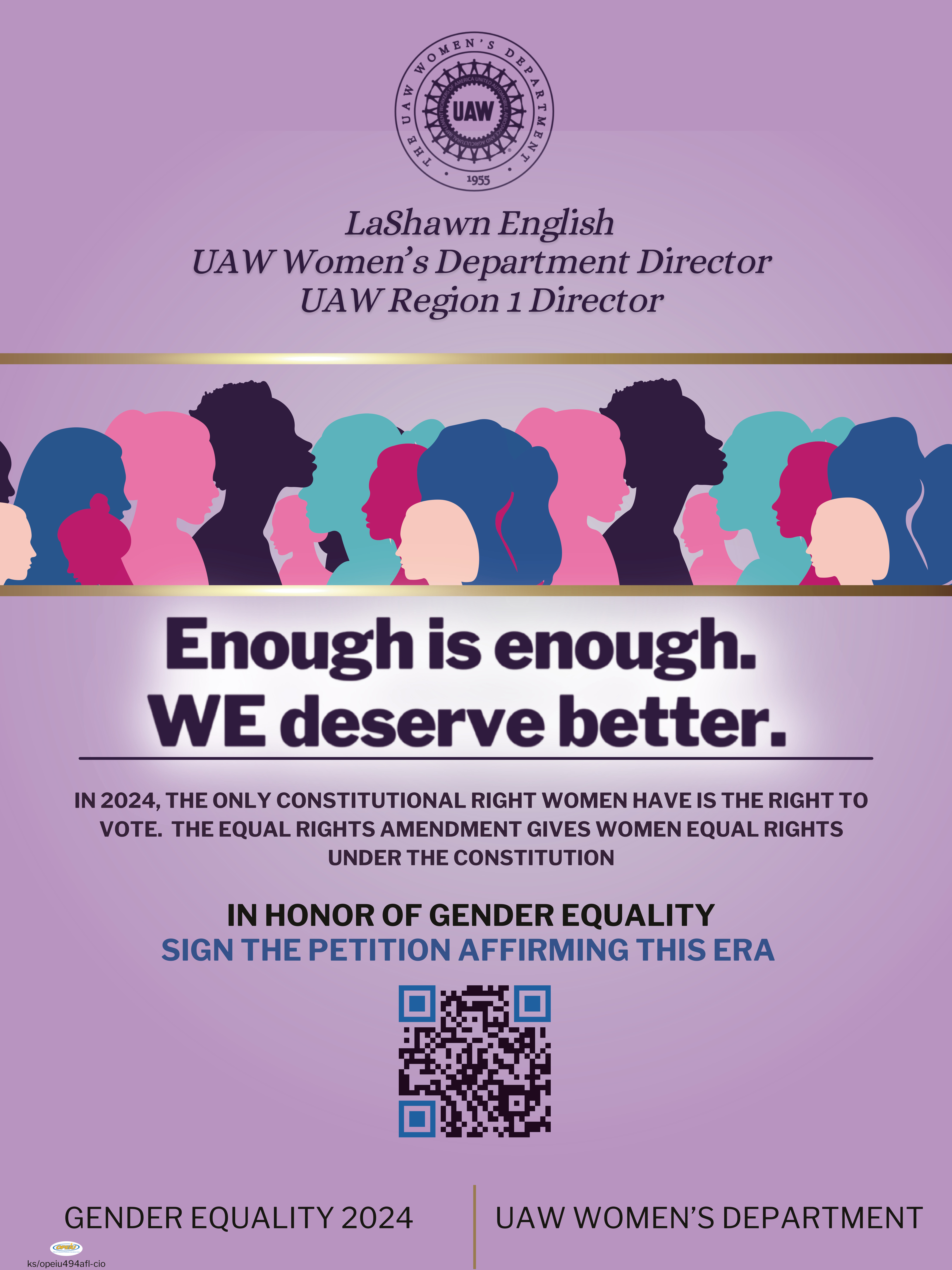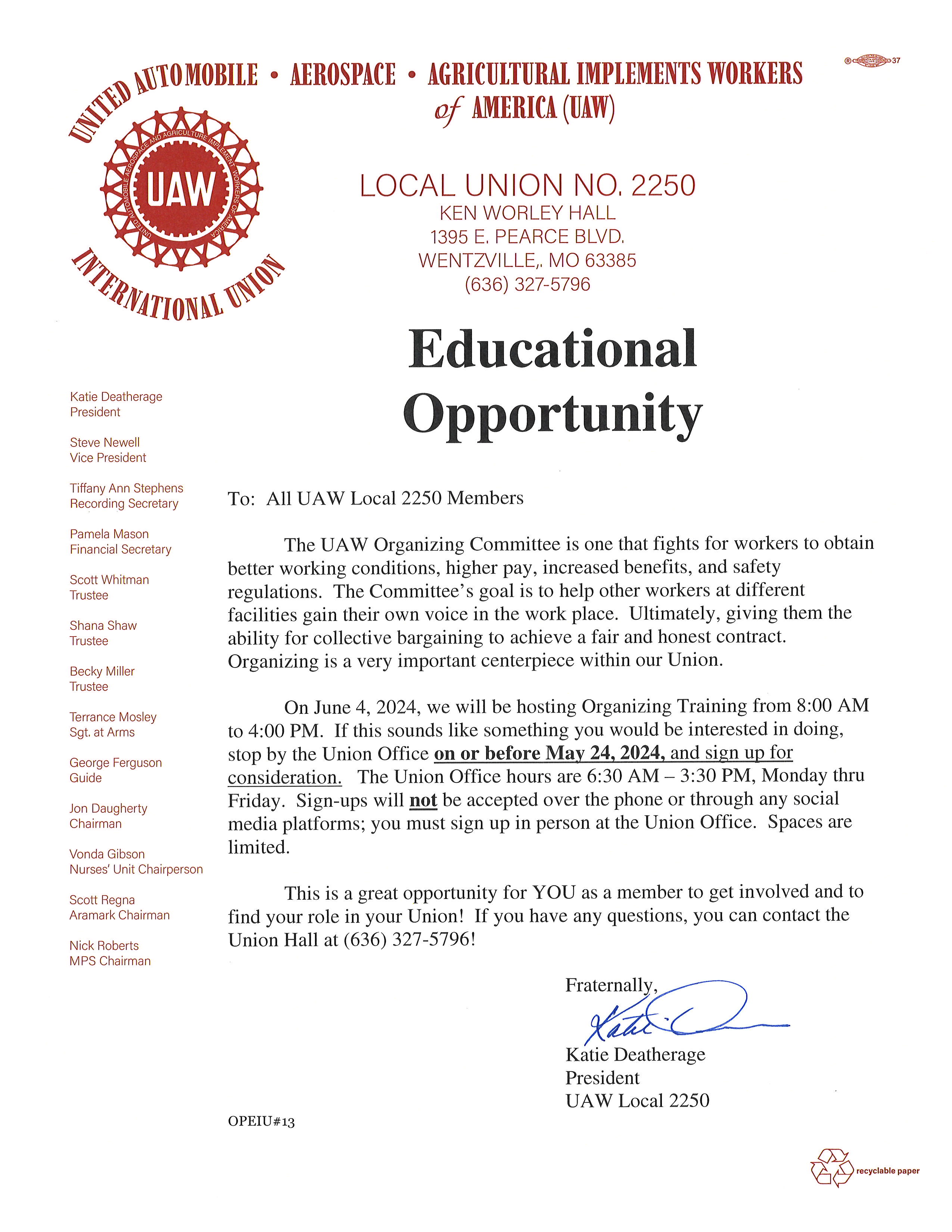-
Sunday Stats: Union Members PAY Increasing Faster Than Nonunion Workers - 5 hours ago
-
Going To The Annie Malone Parade? Read This. - May 16, 2024
-
Aramark Run-Off Results - May 14, 2024
-
Union Meeting Tomorrow! - May 14, 2024
-
Memorial Saturday: Is GM Destroying A Win-Win For Business, Labor and Government? - May 12, 2024
-
Welcome To The May 9th Orientation Class! - May 10, 2024
-
Why Are We Making Up Units From The Strike? We Can Change! - May 10, 2024
-
This UAW Legend Died 54 Years Ago Today - May 9, 2024
-
The Annie Malone Parade Is About To Start! - May 9, 2024
-
Got Questions? Get Answers! - May 8, 2024
MO AFL-CIO Weekly Labor Report: UAW Rises Again, Non-Competes Go Bye-Bye
Enjoy this Weekly Missouri Labor Report from the Mo. AFL-CIO…
Here is your Missouri Labor Weekly Update!
The Biggest Thing Going:
“Labor Joe” Biden Axes Noncompetes
Joe Biden continues to show why he’s the most pro-labor President in modern history.
A lot is happening in the world, our country, and in our State. But we’re gonna lead with something you may not read about anywhere else; the technical, but important, role of “noncompete” clauses in workers’ contracts. And how Joe Biden is ending them. Let’s learn about it through some Frequently Asked Questions.
What is a Noncompete clause?
A noncompete is a clause in workers’ contracts that restricts their future labor opportunities. Noncompetes require that workers forgo opportunities in future employment with other companies (or start their own business) in exchange for present employment with their current company. Designed to prevent workers from taking their labor to a competing company noncompetes can be structured by industry (you can’t work for a company like ours), by time (you can’t work in this industry for a year if you leave), or by distance (you can’t work for a competitor within 50 miles of here).
Why are noncompetes bad for workers?
Noncompetes lower wages and reduce opportunities for workers by trapping them with their current employer and banning them from the free market practice of selling their labor to a higher bidder. Being locked into a single employer also reduces the employee’s bargaining power vis-a-vis that employer. Noncompetes also stifle innovation and job creation by banning employees from taking their skills and starting their own businesses. In situations where noncompetes are distance-based, they can require employees to drive dozens of miles away from their homes to find employment, increasing transportation costs and reducing workers’ time with their families.
How common are noncompetes? Isn’t it just CEOs that are subject to them?
Noncompetes are WAY more common than you might think! The Federal Trade Commission (FTC) estimates that up to 30 million workers (1 in 5!) are bound by noncompetes. Noncompetes certainly do bind corporate executives and those with proprietary knowledge, but they are completely out of control and now are prevalent in fields such as medicine, fast food, service workers, and on and on.
What’s a (hypothetical) Example of a Noncompete In Practice?
It’s estimated that as many as 80% of fast food restaurants utilize some form of noncompetes. A worker may take a job at Wendy’s making $13 an hour, but a condition of the job is signing a noncompete. Once the worker signs the noncompete, a condition of employment, Wendy’s knows the worker can take a job at a competitor, so they stop giving the worker raises. Two years later the worker, who had never been given a raise, wants to take a job making $14 an hour at Burger King. Wendy’s could sue the low-wage workers and prevent them from taking the higher-paying Burger King job. Unable to go anywhere else, the worker would have little choice but to continue to make $13 an hour trapped at Wendy’s.
How are noncompetes being banned?
In July of 2021, President Biden issued an executive order on promoting competition in the economy and specifically urged the FTC to ban noncompetes. This was coupled with his nomination of noted antitrust lawyer Lina Kahn to be Chair of the commission and her outspoken goal of banning the practice of corporate noncompete clauses.
The Federal Trade Commission, which is charged with looking out for consumers, then employed the administrative rule-making process to use its authority under the Federal Trade Commission Act to ban the practice. The FTC issued a proposed rule in January 2023, with the final rule being approved 15 months later at the end of April.
Chair of the Commission Lisa Kahn deserves enormous credit for making the new rule a priority for the FTC.
What does the FTC rule do?
The FTC rule would terminate the existing noncompetes of an estimated 99.25% of workers currently bound by them. Existing noncompetes would be allowed for a tiny fraction of senior executives with actual, defined, proprietary information and decision-making authority. The rule would also ban ANY noncompete clauses going forward. This means nearly 30 million American workers would immediately be freed from corporate imposed constraints on their labor and the freedom to determine their own lives. It’s estimated that this increased labor freedom will result in
What Will Be the Impact of Banning Noncompetes?
For individual people being freed from coercive noncompetes will be life-changing. Broadly speaking the freeing of 30 million workers from restrictions on labor will set off a wave of innovation and wage increases. The FTC estimates that the new rule will result in the formation of over 8,000 new businesses a year. The average worker will see a pay increase of over $500 a year. And that healthcare costs will be reduced by nearly 200 BILLION over the next decade. Some really rich folks may be slightly less rich though.
How did the FTC Commissioners Vote on the rule banning noncompetes?
The final vote to ban noncompetes was 3-2, with the three Democratic Commissioners voting with workers and the 2 Republican commissioners voting with the large corporations. Simply put, the ban on noncompetes would not have happened if Joe Biden was not President of the United States.
What happens now?
The Rule is set to go into effect 120 days after final approval. This would mean that noncompetes would be banned at the end of August. Unfortunately, the US Chamber of Commerce has already announced that they will sue to stop the rule. This may delay final implementation until the lawsuits are adjudicated. The Chamber’s final goal is to delay implementation, elect accused felon Donald Trump, and have him attempt to reverse the ban before it can be implemented. The outcome of the 2024 Presidential election will likely determine whether 30 million workers are bound by corporate noncompetes, or whether they are free to change jobs and control their own labor.
Labor Buzz: What You Need to Know
Nationally
Victory in the South! For loyal readers of the Labor Update you know we’ve spent the last several weeks doing a deep dive on southern labor organizing. Last week a major battle was won when the workers at Volkswagen in Chattanooga, TN voted OVERWHELMINGLY to form a union and be represented by the United Auto Workers. After losing previous votes in 2014 and 2019, the 73% YES vote for the union sends a major message that times are changing. Next up is the UAW vote in Alabama’s Mercedes plant, scheduled to be finalized on May 17.
AFL-CIO National President Liz Shuler released a statement that said in part: “We congratulate the Volkswagen workers, our UAW family, and UAW President Shawn Fain for this monumental victory in Chattanooga. The victory at Volkswagen’s plant in Tennessee marks a historic milestone for workers across the state and the broader South. Led by a diverse coalition of young activists, this triumph challenges outdated labor laws and sets new standards for collective bargaining power. It symbolizes a shift away from the old economic model that prioritizes the profits of big corporations to a new era where working people have the power to shape our futures.”
UAW President Shawn Fain and two of the newest members of the union family celebrate at the victory party in Chattanooga (Photo from Tennessee Lookout)
Missouri
Initiative Petition Turn In Week
Missouri workers took a major step forward this week when the Missourians For Healthy Families and Fair Wages ballot initiative turned in its signatures to put a $15 minimum wage and earned sick time on the ballot! The coalition collected over 200,000 signatures from voters in every county in Missouri. The signatures now go to the Secretary of State for verification, and once verified the Governor will decide if it goes on the August or November ballot.
Members of the grassroots Healthy Families coalition celebrate after turning their signatures in at the Secretary Of State’s Office on Wednesday.
Crystal Buffaloe of DBRL (AFSCME 3311) shows what 200,000+ signatures look like.
The Sports Gaming initiative petition turned in its signatures Thursday, and the pro-choice IP Missourians for Constitutional Freedom is set to turn in an overwhelming number of signatures today!
While all three IP’s need to be verified by the SOS, it certainly appears that all three issues will be on the ballot for voters this year. Whether they are on in August or November is too early to tell. For more information on how you can get involved and make sure the Healthy Families IP passes on the ballot, you can visit here.
Jay Nixon’s former Press Secretary and current sports gaming spokesman Jac Cardetti (Italian for Jack Cardetti) turns in signatures to put legalizing sports betting on the ballot.
Legislature
The Missouri legislature remains a mess. After filibustering for 41 hours the five members of the far-right Republican caucus sat down and allowed the first vote on the renewal of the Federal Reimbursement Allowance (FRA) that funds a significant portion (4.2 Billion) of the state’s Medicaid program. The senators had been filibustering demanding the passage of the now ballot-candy file “IP Reform” scam before they would allow the FRA to pass. The FRA still needs another Senate floor vote next week before it can be sent to the House. The Senate still has to pass its version of the budget, and then iron out any differences with the House, before the Constitutional deadline of next Friday, May 10.
In Solidarity,Stephen Webber
Missouri AFL-CIO, Communications Director


